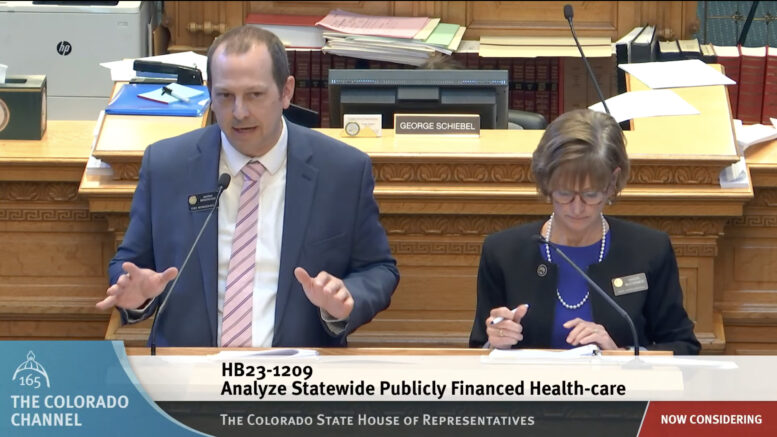Colorado legislators quietly killed a bill Sunday to study implementation of a single-payer health-care system, letting it die on the Senate calendar rather than give it a vote of preliminary approval that was needed to pass it officially on the final day of the legislative session Monday.
Rep. Andy Boesenecker, D-Fort Collins, wanted through House Bill 1209 to have the Colorado School of Public Health work with a task force to analyze the costs and benefits of putting a government-paid health-care system into place in this state. The task force would have had to create model legislation for such a move and submit a report by October 2024 that analyzed costs, identified potential funding sources, analyzed connections to federal law and confirmed that the legislation would have had the desired results.
Boesenecker acknowledged in a presentation to the Colorado Chamber of Commerce’s health policy council in March that implementation of such a system, similar to those used in Canada and much of Europe, would be incompatible with some reforms pushed by Gov. Jared Polis over the past four years. In particular, a single-payer system would negate the Colorado Option program in which insurers are required to offer lower-cost health-care plans to save state residents money.
Why backers wanted the bill
But he said he believes that Colorado officials need to take a hard look at how much money state residents could save if the state were to cover the full costs of their care, as well as what it would take to move from an individual-payer system to a government-payer system. A fiscal appropriation attached in the Senate Appropriations Committee would have set aside $604,560 for the study had the bill passed.
“My hope with the study is to actually pull in diverse stakeholders to feel that they were at the table,” said Boesenecker, who co-sponsored HB 1209 with Democratic Rep. Karen McCormick of Longmont. “I think ultimately what we need to do is pull together a group of people on the policy and start asking hard questions on it.”

Colorado state Rep. Andy Boesenecker speaks to the Colorado Chamber of Commerce Health Policy Council in March 2023.
The study idea received support from medical groups such as the Colorado Academy of Family Physicians and Colorado Nurses Association, as well as from health-care-advocacy groups like AARP and the Colorado Consumer Health Initiative. But it drew opposition from insurers like Cigna and Kaiser Permanente, business groups from the Colorado Chamber of Commerce to the Colorado Contractors Association and even the Colorado Dental Hygienists Association.
Concerns about single-payer health-care system
In addition to concern about where the government would find the funding to launch such a system — a figure that has been estimated as high as $36 billion — opponents feared the loss of jobs from entire industries like insurance that would be wiped out under such a system. And they questioned how Colorado could move forward on its own on such a system, particularly with so many of its interstate employers offering national health-care plans and with the possibility that Colorado could get a flood of new residents seeking free health care.
Saskia Young, executive director of the Colorado Association of Health Plans, noted that a 2016 ballot initiative to create a single-payer plan in Colorado failed by a vote of 4-to-1, spurring in part Polis’ efforts to pass health-care reforms that have been estimated to cost a combined $41 million since he became governor in 2019. Because of those factors particularly, the state should not continue to waste money looking at such a system, she said in a statement to The Sum & Substance.
“We believe the state should focus on stabilizing the current healthcare system through predictive and supportive policymaking that incentivizes a robust health-insurance market that provides a choice of products and plans to consumers, rather than pushing policies that directly contradict that effort,” Young said.
The House passed HB 1209 on a largely partisan 42-20 vote, with only Democratic Reps. Shannon Bird of Westminster and Marc Snyder of Manitou Springs joining Republicans in opposing the measure. But the bill then ran into trouble in the more moderate Senate.
Stalled in the Senate

Colorado state Sen. Sonya Jaquez Lewis speaks on the Senate floor earlier this month.
Sponsoring Sen. Sonya Jaquez Lewis, D-Longmont, added several business-requested amendments in the Senate Committee on Health and Human Services on April 27. Those would have required CSPH in its study to incorporate an actuarial analysis of implementing a single-payer system, to examine the impact of such a system on union members covered by national collective bargaining agreements and to add to the study task force representatives of pharmacy benefit managers, self-insured employers and organized labor.
While the bill scooted out of that committee and the Senate Appropriations Committee on party-line votes, with the latter committee passing just on Friday, it never appeared to rise to the priority level of other Democratic bills or other Democratic-sponsored health-care bills.
And with the House and Senate pressing late into the night the past few nights on priority bills such as the recently introduced efforts to try to limit property-tax hikes and spread Taxpayer’s Bill of Rights refunds evenly among residents, HB 1209 never found the space to make it onto the debate calendar.
